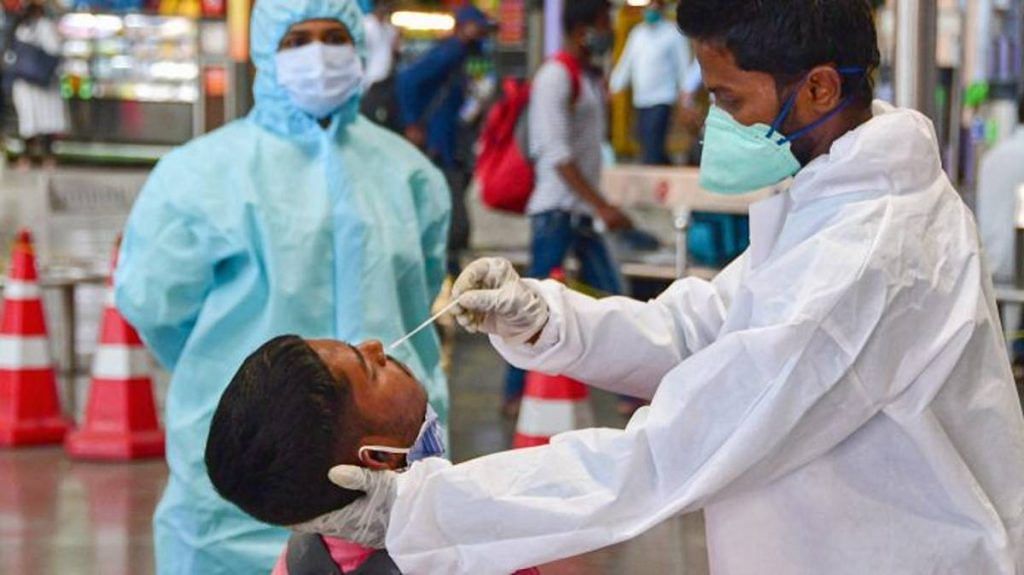New Delhi: Scientists have identified a marker that can indicate the “fitness” level of lung cells and can, therefore, be used to predict whether or not a person would get serious Covid even before it has been contracted.
This was reported by scientists from several international institutes, including the Max Planck Institute for Heart and Lung Research, Champalimaud Centre for the Unknown, The University of Queensland, Brisbane and University of Wisconsin, in the open access journal EMBO Molecular Medicine.
The marker called hFwe-Lose, can also be a predictor of how much a person would be susceptible to the long term effects of Covid — commonly known as ‘long Covid’, one of the authors of the study told ThePrint.
Explaining the significance of the paper, the authors wrote: “Assessing the degree of risk for the development of severe Covid-19 is an important consideration in the management of the current pandemic. Such a tool would be useful for the triage of patients that test positive for Covid-19, thus enabling those likely to develop severe symptoms closer monitoring and earlier access to hospitalization and intensive care… the cell fitness marker hFwe-Lose accurately predicts outcomes in Covid-19 patients. This demonstrates how tissue fitness pathways dictate the response to infection and disease, and their utility in managing the current COVID-19 pandemic.”
To identify the marker, the researchers performed post-mortem analysis of Covid-infected lung tissues and determined that the cell fitness marker — hFwe-Lose — can precede the host immune response to infection.
More importantly, the expression levels of hFwe-Lose outperformed conventional methods in predicting outcomes in Covid patients (hospitalisation or death), making it a better predictor of a person’s disease severity than other commonly used predictors such as age and comorbidity.
Also read: Women have borne the brunt of the pandemic. Here’s how the UN is going to address it
“Cell fitness can predict outcomes of other diseases too”
Dr Rajan Gogna, assistant professor, University of Copenhagen’s Faculty of Health and Medical Sciences, who is one of the authors of the study told ThePrint that a method like this could have impacted Covid mortalities significantly during the second wave, especially in countries like India where health infrastructure is not adequate.
“This paper is important because there are benefits to society and is also cutting edge science. Just from a test from your nasal swab — the cells of the nasal epithelium — they can show what is happening in the cells in the lungs. We have found a gene that predicts the cellular fitness of the cells in our lungs with which we can predict how severe the disease will be,” Dr Gogna said.
“The mistake people were doing was that they were chasing the immune response. There is something that happens even before the immune response goes out of hand. Even before that happens, the virus starts killing lung cells. The fitness of the lung cells can prevent that. Age and comorbidity are not perfect markers but I believe this discovery would have had a bigger impact in preventing fatalities in the second wave.”
The reference to the immune response is about many Covid deaths being traced to a hyperactive immune system, called a cytokine storm, that ends up killing the person.
Dr Gogna added that cell fitness can be used as a predictor of the severity of other diseases too. “Cell fitness is an emerging concept. That has a role to play in disease biology and can also apply to TB, influenza, as in most of these pathologies the problem is the death of lung cells. Cell fitness also explains long Covid and also why some people die despite vaccinations,” he said.
The paper argues that for effective management of Covid patients, it is essential to identify and, where necessary, triage Covid-19 patients at high risk of poor disease outcomes. But they were not immediately able to explain why this particular marker can predict outcomes.
“At present, why hFwe-Lose expression in the respiratory tract is associated with severe Covid-19 remains unclear. It has been shown in the past that environmental changes within our body including nutrient state, inflammation, and notably, immune function impact relative fitness status of cells and their contribution to their tissue space. Chronic inflammation, including dietary-associated inflammation and obesity, antagonizes homeostatic fitness sensing mechanisms and results in higher retention of suboptimal cells, thereby worsening tissue fitness over time,” the researchers wrote in the paper.
(Edited by Poulomi Banerjee)
Also read: India builds up Covid vaccine stocks as it readies to restart global shipments
